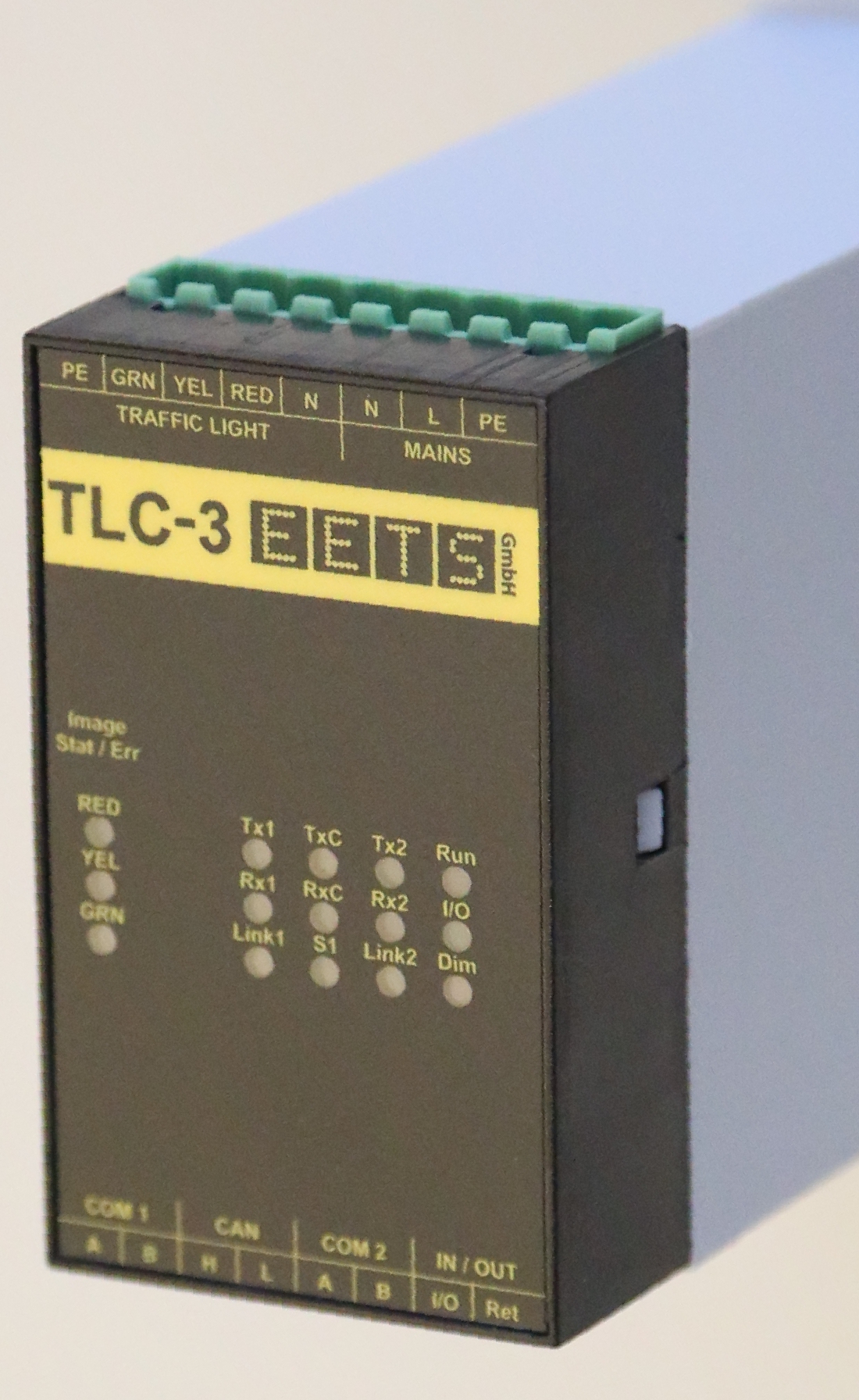Traffic Light Controller TLC-LED, Version TLC-003 (NEW)
Traffic light controller for LED traffic lights
Version TLC-003 (NEW)

Abstract
With the traffic light controller TLC-LED, LED traffic lights can be integrated uniformly in a modern installation structure which is based on serial interface and TLS system philosophy. A TLC module as logical signal unit can drive up to three LED traffic lights inserts which corresponds to a three-chamber traffic light. The traffic light controller disposes of active monitoring and defect detection of the driven loads via current measurement. It also contains additional functions like autonomous flash mode, flash synchronization, transition control, emergency control, and dimming.
Features
- Control of up to three 230 VAC LED traffic light inserts (corresponds to one three-chamber traffic light)
- Serial EIA-485 communications interface, galvanically isolated
- Communications protocol according to the TLS 2012 standard
- Permanent monitoring of the electrical load and self-monitoring function
- Supplementary operating functions like flash mode, barring, signal transitions
- Extended range of operating temperature (-20 to +70°C)
- Control of dimming functions for traffic light inserts (not available for all products)
- 2nd serial EIA-485 interface for optional expansion with a second control path
- CAN bus connection for optional expansion with digital inputs and outputs (with I/O module IOC-002)
Functional description
The traffic light controller forms a standard connector between a modern, serial signal control and conventionally controlled LED traffic lights. The TLC-LED can control up to three LED traffic light inserts which corresponds to a three-chamber traffic light. If supported by the LED inserts, brightness can be reduced by a single-stage voltage reduction. The serial EIA-485 interface as well as all other incoming and outgoing lines are galvanically isolated and protected against overvoltage. Data communication is based on the TLS-Protocol 2012. During operation, the electrical load is permanently monitored and detected defects are reported.
The TLC-LED can be extended via the CAN bus with digital I/O modules (IOC-002), with which e.g. an additional parallel interface for project-specific emergency operation or local operation can be realized. A second, full-value control path can optionally be realized via the second serial interface.
The test and communications software TLC Master allows testing and demonstrating of the functions of the TLC-LED, configuring the OSI2 address as well as performing a firmware upgrade if required.
Documents
Info - Documents
 |
Traffic Light Controller for LED Traffic Lights, TLC-LED (TLC-003) | Data sheet (german) |
 |
Contrôleur des feux trafic LED, TLC-LED (TLC-003) | Fichier technique (french) |
Technical - Documents
 |
Traffic Light Controller - TLC-003 | Technical Manual (german) |
 |
Block diagram TLC-003 | Graphic |
 |
Dimensions of module TLC-003 | Technical data sheet (german) |
 |
Front connection TLC-003 | Technical data sheet |
Communication protocol - Documents
 |
Vendor specific TLS data frames | Technical data sheet |
 |
Supported TLS data frames | Technical data sheet |
 |
Application notes for Flasher sychronization | Technical data sheet |
 |
Link to TLS 2012 Specification (BASt) | Standard specification TLS 2012 (only german) |
Test- and Configuration application
 |
TLC-Master for Windows | Download Installation file for Windows Version 1.18.0 (for WIN 7 and higher) |
 |
TLC-Master for Linux | Download Debian packed for Ubuntu Version 1.18.0 |
 |
Link to Repository | Link to Debian Repository for Ubuntu (current for Bionic Beaver, LTS 18.04) ⇒ Informations in "Show Help" |
 |
User manual of TLC-Master | User manual (german) |
